lundi, 27 décembre 2021
Israel Lira - Critique épistémologique de l'"Ur-Fascisme" d'Umberto Eco
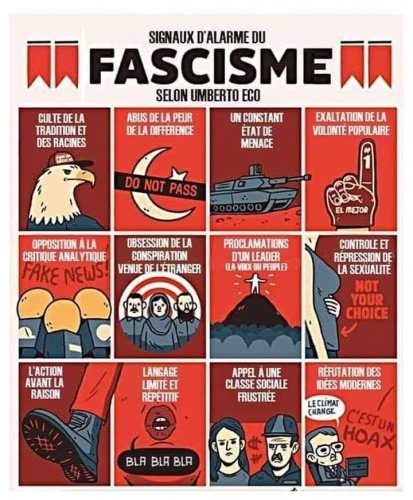
Critique épistémologique de l'"Ur-Fascisme" d'Umberto Eco
par Israël Lira (2017)
Ex: https://legio-victrix.blogspot.com/2021/01/israel-lira-critica-epistemologica-ao.html?fbclid=IwAR38npV79Y-qXvC19qMq0ICJdazVy8-XX-_xYOFJqilg83z6rfjMXrvVEck
"On remarque que, tel qu'il est utilisé, le mot "fascisme" n'a presque aucune signification. Dans la conversation, il est utilisé de manière encore plus insensée que dans la presse. D'après ce que j'ai entendu, elle s'applique aux agriculteurs, aux commerçants, au crédit social, aux châtiments corporels, à la chasse au renard, à la tauromachie, au comité de 1922, au comité de 1941, à Kipling, à Gandhi, à Chang Kai-Shek, à l'homosexualité, aux programmes de Priestley, aux auberges de jeunesse, à l'astrologie... aux femmes, aux chiens et à je ne sais quoi d'autre" [1]. Une citation orwellienne qui est plus pertinente aujourd'hui que jamais, car face à l'instabilité de la région, s'il semble y avoir plus de fascistes qu'à l'époque de la montée du fascisme, eh bien c'est parce que le terme a déjà été complètement vidé de son contenu.
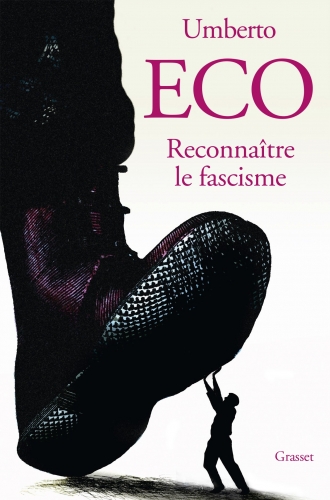
Umberto Eco, l'écrivain et philosophe italien, n'est certainement pas le genre de personne qui abandonne son objectivité juste pour soutenir un système de pensée ; au contraire, il s'est toujours caractérisé par sa grande sagesse sur de nombreux sujets, surtout lorsqu'il s'agit de sémiotique [2]. Sans préjudice de cela, et en hommage à l'amicus plato sed magis amicas est veritas [3], on ne peut manquer de remarquer que, concernant ses thèses traitant de la phénoménologie fasciste, et bien qu'elles ne manquent pas de révéler des positions intéressantes qui nécessiteraient un plus grand contraste empirique - en raison du manque général d'intérêt pour l'investigation objective du sujet - il y a certaines déficiences qui diminuent l'objectivité du discours d'Eco, ceci dans le cadre d'une critique strictement encadrée par l'épistémologie.
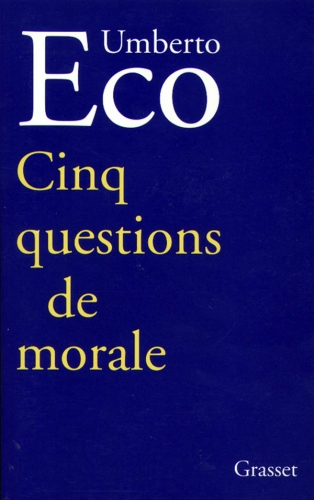
Eco, dans son œuvre Cinq questions de morale, nous présente une partie orientée vers l'analyse de ce qu'il considère comme les caractéristiques essentielles et imperturbables d'un concept de fascisme, dans laquelle il expose ses 14 points :
"Le terme "fascisme" convient à tout, car il est possible d'éliminer d'un régime fasciste un ou plusieurs aspects, et on peut toujours le reconnaître comme fasciste. Si l'on retire l'impérialisme du fascisme, on obtient Franco ou Salazar ; si l'on retire le colonialisme, on obtient le fascisme des Balkans. Ajoutez au fascisme italien un anticapitalisme radical (qui n'a jamais fasciné Mussolini) et vous avez Ezra Pound. Ajoutez le culte de la mythologie celtique et du mysticisme du Graal (complètement étranger au fascisme officiel) et vous obtenez l'un des gourous fascistes les plus respectés, Julius Evola. Malgré cette confusion, je pense qu'il est possible d'indiquer une liste de caractéristiques typiques de ce que j'aimerais appeler "Ur-Fascisme", ou "fascisme éternel". Ces caractéristiques ne peuvent être encadrées dans un seul système ; beaucoup se contredisent et sont typiques d'autres formes de despotisme ou de fanatisme, mais il suffit que l'une d'entre elles soit présente pour que se coagule une nébuleuse fasciste.
1. La première caractéristique d'un Ur-Fascisme est le culte de la tradition. (...) En conséquence, il ne peut y avoir de progrès de la connaissance. La vérité a été annoncée une fois pour toutes, et la seule chose que nous pouvons faire est de continuer à interpréter son message obscur.
2. Le traditionalisme implique le rejet du modernisme. (...) Le rejet du monde moderne était camouflé en une condamnation du mode de vie capitaliste, mais il s'agissait surtout du rejet de l'esprit de 1789 (ou 1776, évidemment). Les Lumières, l'âge de la raison, sont considérées comme le début de la dépravation moderne. Dans ce sens, l'Ur-Fascisme peut être défini comme un "irrationalisme".
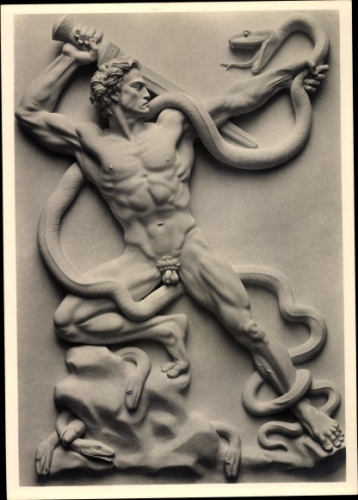
3. L'irrationalisme repose également sur le culte de l'action pour l'action. L'action est belle en soi, et il faut donc agir d'abord, sans aucune réflexion. Penser est une forme de castration. C'est pourquoi la culture est suspecte dans la mesure où elle est identifiée à des attitudes critiques.
4. (...) Pour l'Ur-Fascisme, la dissidence est une trahison.
5. Le désaccord est également un signe de diversité. L'Ur-Fascisme se développe et cherche le consensus en exploitant et en exacerbant la peur naturelle de la différence. Le premier appel d'un mouvement fasciste, ou prématurément fasciste, est contre les intrus. L'Ur-Fascisme est donc raciste par définition.
6. L'Ur-Fascisme naît d'une frustration individuelle ou sociale. Cela explique pourquoi l'un des traits typiques des fascismes historiques a été l'appel aux classes moyennes frustrées, découragées par une crise économique ou une humiliation politique, effrayées par la pression des groupes sociaux subalternes.
7. (...) la racine de la psychologie Ur-Fasciste réside dans l'obsession du complot, éventuellement international. Les sbires doivent se sentir assiégés. Le moyen le plus simple de faire apparaître un complot est de faire appel à la xénophobie.
8. Les hommes de main doivent se sentir humiliés par la richesse et la force ostentatoires des ennemis. (...) les ennemis sont simultanément très forts et très faibles.
9. Pour l'Ur-Fascisme, il n'y a pas de lutte pour la vie, mais "la vie pour la lutte". Le pacifisme est alors une connivence avec l'ennemi ; le pacifisme est mauvais car la vie est une guerre permanente.
10. L'élitisme est un aspect typique de toute idéologie réactionnaire, en ce sens qu'elle est fondamentalement aristocratique. Tout au long de l'histoire, tout élitisme aristocratique et militariste a impliqué le mépris des faibles. L'Ur-Fascisme ne peut éviter de prêcher un élitisme populaire.
11. Dans cette perspective, tout le monde est éduqué pour devenir un héros. (...) Ce culte de l'héroïsme est étroitement lié au culte de la mort... (...).
12. La guerre permanente et l'héroïsme étant des jeux difficiles à jouer, l'Ur-Fasciste transfère sa volonté de puissance sur les questions sexuelles. C'est l'origine du machisme (qui implique le mépris des femmes et une condamnation intolérante des mœurs sexuelles non-conformistes, de la chasteté à l'homosexualité).
13. L'Ur-Fascisme est basé sur un populisme qualitatif. (...) Pour l'Ur-Fascisme, les individus en tant que personnes n'ont aucun droit, et le peuple est conçu comme une qualité, une entité monolithique exprimant la volonté commune.
14. L'Ur-Fascisme parle la Novilangue. La novlangue a été inventée par Orwell dans 1984 comme la langue officielle de l'Ingsoc, le socialisme anglais, mais des éléments de l'Ur-Fascisme sont communs à diverses formes de dictature. Tous les textes scolaires nazis ou fascistes étaient basés sur un lexique pauvre et une syntaxe élémentaire afin de limiter les outils de raisonnement complexe et critique. Mais nous devrions être prêts à identifier d'autres formes de novlangue, même lorsqu'elles prennent la forme innocente d'une émission de télé-réalité populaire" [4].
Cependant, les 14 hypothèses d'Eco semblent n'être qu'une liste exhaustive des aspects négatifs, - dans la forme où elles sont exposées, elles ressemblent presque à des apothéismes - caractéristiques d'une étape antérieure à celle d'une théorisation scientifique, puisqu'elles n'ont pas été mises en contraste avec les aspects positifs du fascisme, car en ne l'affirmant pas, on pécherait en biaisant les variables au détriment d'une vision objective, puisqu'il faut peser les aspects positifs et négatifs pour porter un jugement scientifique, qui nous permettra de tirer des conclusions sur les caractéristiques essentielles d'un phénomène ou d'un fait recherché ou étudié : "Pour combattre [5] le fascisme, il faut le comprendre, ce qui implique de reconnaître qu'il contient certaines bonnes choses ainsi que de nombreuses mauvaises" [6] ; ce parti pris d'Eco est encore plus évident lorsque George Orwell [7], antifasciste convaincu, fait preuve d'une plus grande objectivité que son homologue italien dans son traitement du sujet, puisque certaines des affirmations qu'Eco prend pour acquises - dans ses 14 points, et même dans une logique pars pro toto - indiquent qu'un de ces 14 points suffit à configurer le concept, nous conduisant à un anarchisme sémantique dans lequel tout ce qui tombe dans l'un de ces 14 points est fasciste - dans une approche orwellienne, ces 14 points ne seraient pas entièrement corrects, ce qui sape l'objectivité de l'argument d'Eco, sans lui enlever sa potentialité en tant que contre-pied empirique ultérieur :
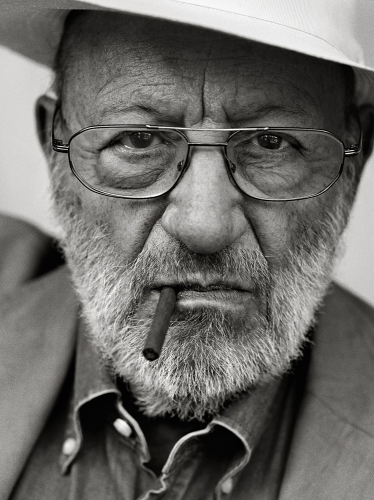
"De toutes les questions en suspens de notre époque, la plus importante est peut-être : qu'est-ce que le fascisme ? L'une des organisations qui réalisent des études sociologiques aux États-Unis a récemment interrogé une centaine de personnes à ce sujet et a obtenu des réponses allant de la "démocratie pure" au "diabolisme pur". Dans ce pays, si vous demandez à l'homme de réflexion moyen de définir le fascisme, il répond généralement en donnant l'exemple des régimes qui ont régné jadis en Allemagne et en Italie. Mais ce n'est pas satisfaisant, car même les grands États fascistes diffèrent grandement en termes de structure et d'idéologie. Il n'est pas facile, par exemple, d'inclure l'Allemagne et le Japon dans le même schéma, et il est encore plus difficile d'y inclure certains des petits États qui peuvent être décrits comme fascistes. On suppose, par exemple, que le fascisme est intrinsèquement belliciste, qu'il s'épanouit dans une atmosphère d'hystérie guerrière et qu'il ne peut résoudre ses problèmes économiques qu'en dépensant pour préparer des guerres ou conquérir des pays étrangers. Mais cela est clairement faux si l'on prend l'exemple du Portugal ou des différentes dictatures d'Amérique du Sud. Ou d'un autre côté, l'antisémitisme est censé être l'un des signes distinctifs du fascisme ; mais certains mouvements fascistes ne sont pas antisémites" [8].
De ce qui a été dit, on peut conclure que ces caractéristiques d'un fascisme éternel exposées par Eco dans ses 14 points, ne sont pas en accord avec la téléologie de la même re-signification qu'Eco a cherché à soutenir, de sorte que nous serions face à une incohérence apparente, puisque le concept ne serait pas fidèle à son fondement (Bunge, 2009), en cela, le concept d'Ur-Fascisme, serait sans rapport avec son fondement dans des caractéristiques qui ne se produisent tout simplement pas - en général -, ou ne se produisent pas dans tous les fascismes, comme Orwell l'a mentionné, concernant le bellicisme inhérent, l'appel aux classes frustrées, la xénophobie et l'antisémitisme. Étant donné que, pour ces raisons, le fascisme éternel d'Eco ne serait pas configuré comme une théorie scientifique sur la phénoménologie fasciste, mais simplement comme un ensemble d'hypothèses lâches qui n'ont pas atteint un degré de théorisation, nécessaire pour traiter le phénomène que l'on essaie d'expliquer d'une manière objective: "(...) au-delà des détails historiques du fascisme, il y a quelque chose d'éternel. L'écrivain italien Umberto Eco l'a appelé "Ur-Fascisme", ce qui signifie "primitif" ou "original". Malheureusement, ses "quatorze points" irréguliers étaient trop axés sur le totalitarisme descendant des grands dictateurs fascistes et de leurs collaborateurs. Leur "Ur-Fascisme" n'était pas assez "primitif". Ce n'était pas du tout "éternel" [10].
Pourtant, il vaut la peine de sauver des enfermements conceptuels d'Eco, la vérité qu'il a réellement essayé de présenter et qu'il n'a pas réussi à systématiser - étant donné les limites de son expertise académique - et qui est de rechercher l'essence même du fascisme, de ce fascisme primitif et original, de ce fascisme vraiment éternel.
"La plupart des gens associent les "maux" du fascisme à une institution bureaucratique descendante, mais pour moi les fasces semblent symboliser une idée ascendante"[11].

Dans le faisceau de fasces ou fascio littorio, on trouve l'essence même du fascisme le plus primitif :
"Les bâtons du fasces représentent la force et l'autorité d'un collectif uni. C'est leur attrait "primitif". La véritable unité tribale ne peut être imposée d'en haut. Il s'agit d'un phénomène organique. L'unité profonde vient d'hommes liés par un ruban rouge de sang. Le sang de la nécessité catastrophique qui lie la bande des frères devient le sang de l'héritage et du devoir qui lie la famille, la tribu, la nation. Les fasces captent l'imagination humaine car ils semblent symboliser la volonté unifiée des hommes. Les hommes préfèrent croire qu'ils offrent leur loyauté par choix, qu'ils le fassent réellement ou non. La libre association - ou sa simple apparence - est la différence entre les hommes libres et les esclaves. Si vous ne pouvez pas partir, vous êtes un prisonnier. Si vous choisissez de rester, si vous choisissez d'aligner votre destin sur celui du groupe et de vous soumettre à l'autorité collective du groupe, vous êtes un membre et non un esclave. En tant que membre, vous devez apporter le poids de votre masculinité à une confédération unifiée d'hommes" [12].
Notes:
[1] ORWELL, George, "Qu'est-ce que le fascisme ?" The Collected Essays, Journalism and Letters of George Orwell".1968 : "On remarque que, tel qu'il est utilisé, le mot "fascisme" n'a presque aucune signification. Dans la conversation, il est utilisé de manière encore plus insensée que dans la presse. D'après ce que j'ai entendu, elle s'applique aux agriculteurs, aux commerçants, au crédit social, aux châtiments corporels, à la chasse au renard, à la tauromachie, au comité de 1922, au comité de 1941, à Kipling, à Gandhi, à Chang Kai-Shek, à l'homosexualité, aux programmes de Priestley, aux auberges de jeunesse, à l'astrologie, aux femmes, aux chiens et je ne sais quoi encore."
[2] Sémiotique (del gr. semeiotike) n. Science qui étudie les symboles en général. Une branche de cette science est la linguistique, qui étudie le langage, le système des signes linguistiques.
[3] "Platon est un ami, mais la vérité est un meilleur ami." Dire contre le magister dixit, c'est-à-dire l'autorité des fondements par la seule notoriété et la transcendance de l'auteur.
[4] ECO, Umberto. Cinco Escritos Morales. Editorial Lumen. 1997. Pág.47-56.
[5] Ou en tout cas, étudier et/ou approfondir.
[6] ORWELL, George, The Road to Wigan Pier. 1937. Partie II, chapitre 12 : "Pour combattre le fascisme, il faut le comprendre, ce qui implique d'admettre qu'il contient à la fois du bien et du mal."
[7) Eric Arthur Blair ou plus connu sous son nom de plume "George Orwell", écrivain et journaliste britannique d'une grande importance pour la littérature universelle, non seulement pour son style basé sur une excellence critique, mais aussi pour son utilisation d'analogies et de parallélismes pour la présentation de dystopies ou de réalités humaines. Parmi ses œuvres les plus célèbres figurent La ferme des animaux (1945) et 1984 (1949).
[8] ORWELL, George, "Qu'est-ce que le fascisme ? The Collected Essays, Journalism and Letters of George Orwell" (1968).
[10] DONOVAN, Jack, Anarcho-Fascisme In : Un ciel sans aigles Dissonant Hum, 2014.
[11] Ibidem.
[12] Ibidem.
13:13 Publié dans Définitions | Lien permanent | Commentaires (0) | Tags : définition, ur-fascisme, fascisme, umberto eco, philosophie, philosophie politique |  |
|  del.icio.us |
del.icio.us |  |
|  Digg |
Digg | ![]() Facebook
Facebook
mardi, 01 mars 2016
Sur Numero Zéro d'Umberto Eco, en hommage
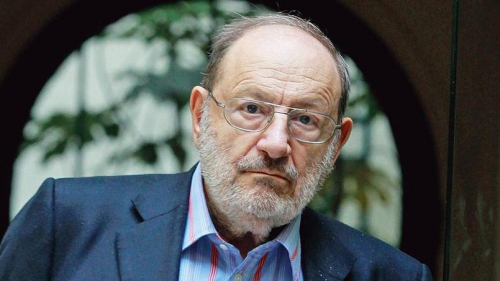
Théories du complot : l'inutile découverte
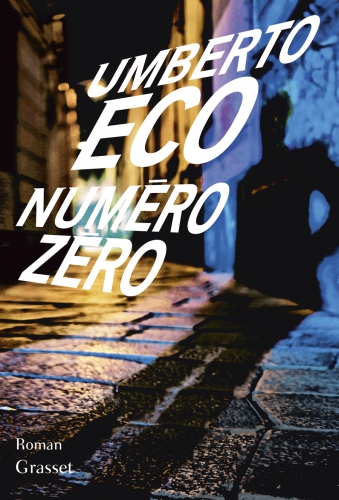 Dans son dernier roman Numéro zéro Umberto Eco décrit la rédaction d'un futur quotidien au début des années 90. On y bidonne tout, des horoscopes aux avis mortuaires, et le journal, aux rédacteurs ringards et aux moyens restreints, et il n'est en réalité pas destiné à paraître. Il servira plutôt d'instrument de chantage à un capitaine d'industrie : il menacera ceux qui lui font obstacle de lancer des révélations scandaleuses ou des campagnes de presse.
Dans son dernier roman Numéro zéro Umberto Eco décrit la rédaction d'un futur quotidien au début des années 90. On y bidonne tout, des horoscopes aux avis mortuaires, et le journal, aux rédacteurs ringards et aux moyens restreints, et il n'est en réalité pas destiné à paraître. Il servira plutôt d'instrument de chantage à un capitaine d'industrie : il menacera ceux qui lui font obstacle de lancer des révélations scandaleuses ou des campagnes de presse. 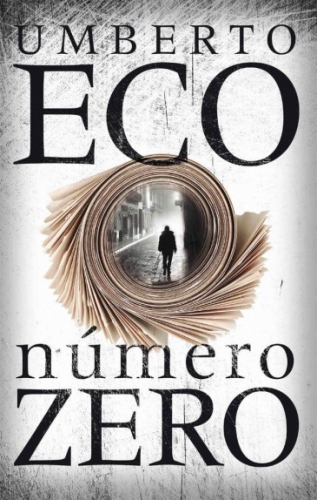 Dans "Le pendule de Foucault", bien des années avant "Da Vinci Code", Eco imaginait un délirant qui, partant d'éléments faux, construisait une explication de l'Histoire par des manœuvres secrètes, Templiers, groupes ésotériques et tutti quanti. À la fin du livre, l'enquêteur se faisait également tuer, et l'auteur nous révélait à la fois que les constructions mentales sur une histoire occulte, qu'il avait fort ingénieusement illustrée pendant les neuf dixièmes du livre, étaient fausses, mais qu'il y avait aussi des dingues pour les prendre au sérieux. Et tuer en leur nom.
Dans "Le pendule de Foucault", bien des années avant "Da Vinci Code", Eco imaginait un délirant qui, partant d'éléments faux, construisait une explication de l'Histoire par des manœuvres secrètes, Templiers, groupes ésotériques et tutti quanti. À la fin du livre, l'enquêteur se faisait également tuer, et l'auteur nous révélait à la fois que les constructions mentales sur une histoire occulte, qu'il avait fort ingénieusement illustrée pendant les neuf dixièmes du livre, étaient fausses, mais qu'il y avait aussi des dingues pour les prendre au sérieux. Et tuer en leur nom.
00:05 Publié dans Hommages, Littérature, Livre, Livre | Lien permanent | Commentaires (0) | Tags : umberto eco, italie, livre, littérature, littérature italienne, lettres, lettres italiennes, théories du complot, complotisme |  |
|  del.icio.us |
del.icio.us |  |
|  Digg |
Digg | ![]() Facebook
Facebook
dimanche, 02 novembre 2014
Ur-Fascism

Ur-Fascism
By Organon tou Ontos
Ex: http://www.counter-currents.com
 The following amplifies the concept of ur-fascism advanced by Umberto Eco [2].
The following amplifies the concept of ur-fascism advanced by Umberto Eco [2].
Ur-fascism is both unity and multiplicity, like life itself: Unity in its embodiment of a single phenomenon and multiplicity because of the diversity and disparity within that phenomenon. “Ur” means primal or primordial: For example, in the form of Heidegger’s “ur-grund” (“primal ground”) or ur-volk (“primeval people”) as well as Goethe’s “ur-phenomenon” (“archetypal pattern”). “Fascism” comes from the Latin, fasces, meaning “bundle”: politically, a people unified. Ur-fascism is the primordial wellspring of all fascist aspirations and movements. This has many roots: Nation, race, ethnicity, heritage, lineage, culture, tradition, language, history, ideals, aims, and values. When a group has emerged, organically and historically, with its own identity, fate, and interests, a people has come into existence.[1]
A people that is integrated genealogically, linguistically, and institutionally at the highest level forms a nation. At higher levels, peoples may be fused together under empires. At lower levels, a people could comprise a family, community, or local state.
Ur-fascism is the primordial foundation of all fascist movements and governments, historically or potentially, that unify peoples at distinct levels. Another term for “people” is the modern English “folk” and the German “Volk.” The former comes from the Old English “folc,” meaning “common people.” “Folk” was diffused through the introduction of the compound “folklore” by antiquarian and demographer, William Thoms. Peoples are distinct and diverse entities, reflected in the history of fascism. Ur-fascism is the primordial origination in archetypal organic patterns, residing in all living things, of a fascistic impulse toward a primeval will to life that has exhibited itself historically in many political, social, and institutional morphologies, ultimately as the differentiation and coagulation of diverse tendencies, traits, and movements.
Ur-fascism metaphysically privileges the people. It accentuates the disparity of interests between peoples, while Marxism emphasizes the disparity of interests between classes. A people is prior to its classes, metaphysically, and its interests take precedence over its classes, ethically.
The founder and leader of the Iron Guard of Romania, Corneliu Codreanu, held that “A people becomes aware of its existence when it becomes aware of its entirety, not only of its component parts and their individual interests.”[2] Ur-fascism grounds the interests of a people or community above that of the individuals and classes that belong to it. As such, it transcends revolutionary socialism and reactionary conservatism. The interests of the community in its entirety take precedence over the interests of individuals and classes that belong to it. Nonetheless, ur-fascism is both revolutionary and conservative: revolutionary in its readiness to overturn structures that are toxic to the life of a people, and once conservative in its insistence on retaining and preserving what is vital to a given people.
On the basis of a view of society as a social organism that is organized, directed, and governed by a vital social organ in the form of the state, Giovanni Gentile maintained that the state “interprets, develops, and potentiates the whole life of people.”[3]
Ur-fascism does not eventuate in the elimination of social classes, hierarchy, or inequality, but rather folds these in to the service of a people as a whole. In a developing plant or animal, cells undergo differentiation and become structurally and functionally suited to certain roles. The Marxist aspiration to end inequality and ultimately dissolve hierarchy is as futile as a revolt among the cells of an organism that is organically suited and required for the weal of the organism as a whole. Equality among an organism’s cells would mean death for the organism. This does not mean that injustice should not be addressed, and inequality and hierarchy are not ends in and of themselves. Neither the aristocratic nor proletarian socialist solution is desirable. Inequality and hierarchy exist to elevate the community as a whole, not any one part of it.
Ur-fascism forms the primeval basis of the fascistic political response and will to life of a people as a whole, rather than any segment within it. If authentic in its embryonic and developmental forms, it will grow to maturity and enable a whole people to persist over time.
A genuine fascist movement or government first exists (a) in embryo, as a nascent political organism or coalescent forces in a government and (b) reaches mature development, around it a variety of explicit aims and goals are embellished and solidified as policies.
In embryonic form, fascist movements and governments originate as phenomena that arise from within a community. According to Umberto Eco, this embryonic form may arise as one, two, or several of the phenomena below, at once or else separately, in orderly or disorderly succession. Ur-fascism is the organic origination of a fascistic movement or government. Just as complex organisms arise from but one, two, or but a few cells, so too does an authentic fascist movement or government. Only one or handful of the phenomena below is necessary, as “it is enough the one of them be present to allow fascism to coagulate around it.” At the national or local level, as nascent movements or existing governments, fascism may initially take the form of, grow from within, or else be signaled and distinguished by:
- Syncretic revival of tradition: reawakening to identity through an integration of disparate traditions, symbols, icons, and ideals among and across past cultures.
- Rejection of modernism: reaffirmation of primordial ideals and political values and a disavowal of the universalism and egalitarianism central to the Enlightenment.
- The necessity of action: realization of the centrality of action as an inherent aspect of a vibrant community, as well as its necessity as a response to decline.
- The necessity of unity: realization of the primacy of primeval truths and basic values, as against perpetual dissent, endless discussion, and disagreement.
- Rejection of difference: affirmation of national, racial, ethnic, cultural, linguistic, or religious identity, and as such, opposition to their erosion and decline.
- Appeal to class interests: repudiation of class conflict and dissention in the community, and an affirmation of the legitimate interests of distinct classes and interests.
- Reality of internal and external threats: drawing attention to internal and external sources of decline and threats to identity, whether ethnic, social, cultural or global in origin.
- Inconstancy in the enemy: the mobilizing and galvanizing reality of distinct threats, often from enemies that fluctuate quickly in strength, tenor, scale, and magnitude.
- Reality of life as struggle: resuscitation and renewal of the community by overcoming decline, while grasping that life is struggle and requires permanent vigilance.
- Populist elitism: elevating the individual as part of his distinct community, promoting its higher over its lower elements, and basing government on the leadership principle.
- A regard for death: realization that death is inevitable, the inculcation of heroic aspiration in everyone, and the mobilizing reality of distant or impending community death.
- Reaffirmation of traditional life: the preservation of traditional families and family roles.
- The primacy of community: recognition of the primacy of community over the individual, the nation over its classes, and the inability of democracy to preserve it.
- The mobilization of language: mobilization of the community is only fully possible through novel uses of language, terms, and phrases, in tandem with symbols and imagery.
The emergence of embryonic fascist movements or nascent fascist governments entails that one, two, or more of the above phenomena have clustered together to form a nucleus, which grows and develops. Ultimately, various policies, plans, and position coagulate around the nucleus. Historically, there were many such policies, plans, and positions. In many cases, they were extensions of the unique vision of the movement or government and the people or nation in question. Whether or not such policies were successful is a different matter, but metaphysically, a fascist movement or government has come to maturity when it has progressed from an embryonic stage in which a nucleus is formed to one in which that nucleus has several different policies clustered around it. These will vary among regimes, but they often include:
- Agrarianism and the preservation of rural life, ethnic identity that is rooted in the unique soil and geographic context of the nation — as in the NSDAP policy of blood and soil.
- Anti-capitalist and anti-consumerist policy that rejects economic materialism.
- Anti-communist policy opposing class conflict and rejecting economic reductionism.
- An anti-liberal domestic policy that rejects individualism as the basis of social life.
- An explicit foreign policy aspiring to autarky and freedom from world finance, and a local policy supporting individual and community self-sufficiency and local adaptedness.
- Policy reflecting support of class collaboration, reconciliation, and legitimate class interests, from basic worker’s rights but also the protection of private property.
- Economic policy grounded in corporatism, syndicalism, mixed economics, and Third Position economics, as was advanced in Italy, Germany, and Falangist Spain.
- Policy reflecting strong support of the young and youth movements, promoting youth that uphold national values and interests, and strengthening the health of the community.
- Environmentalist policy and advocacy of animal welfare, often in conjunction with policy supporting sustainable agriculture, renewable energy, and sound population control.
- Policy advancing irredentist and ethnic nationalist aims, the extension of “living space” (Lebensraum) in German policy or “vital space” (spazio vitale) in Italian policy.
- Familial policy advancing protections for the interests of traditional families, but also promoting the legitimate gender interests for men and women in familial contexts.
- Ethnic and racial policies of fecundism or eugenics, aiming for healthy populations.
- Policy that integrates the interests of the collective with elitist aspirations, synchronizing mass mobilization with the leadership principle, harmonizing individual and society.
- The aestheticizing of social, national, and community life, incorporating social symbols, utilizing rallies, drawing on social ritual and ceremony, and revitalizing traditions.
Eco only discusses the embryonic phase, since his analysis is concerned to explain how fascist movements and nascent fascist governments may emerge. In that sense, his analysis forms a kind of preventative diagnosis, as he aims to show how fascism can be identified before it is allowed to develop into a concrete fascist government.
I have developed his view into a two tiered system, with the embryonic phase representing Eco’s own analysis, and forming the basis for the initial, prenatal phase of fascist development, originating in one, two, or more of the traits I list, each of which is reworded from Eco’s traits; and the developmentally mature stage of fascism, whereby different policies cluster or coagulate around the nucleus that formed in the embryonic stage. Fascism can arise in many ways, and develop many policies.
It is not the case that fascism is a strictly national phenomenon. Instead, it is a way of life that is rooted in organic, synergistic impulse. It can emerge at low societal levels, including the local community (“local fascism”), or else at much higher levels, including the nation.
Moreover, as a response to problems in nations and the decline of communities, fascism has exhibited great historical diversity. Franco’s Spain eschewed expansion, but the pursuit of fresh living space was an important factor in German fascist policy. Italian fascism, however, stressed the pursuit of vital space, which was principally cultural and spiritual, while Mosley’s British Union advocated isolationism and protectionism. And while racial policy was central to German and Norwegian fascism, it was not a central component of Italian Fascism until after 1938, and was never a formulaic component of Portuguese or Spanish fascism. Following World War II, Perón’s Argentina allowed different parties. Catholic conservatism was a significant factor in Spain, while Quisling’s National Gathering looked back to its pagan roots.
Ur-fascism is a family of living worldviews, including past, concrete fascist movements and all possible future movements, and rooting the possibility of fascism in a plurality of different grounds. All movements spring from local conditions and native aspirations.
Understanding ur-fascism as a unique instance of family resemblance also allows us a resource by which to articulate aspects of the decline of European nations and Western Civilization in general. Ur-fascism views different forms of fascism as springing from a common pool of possible sources, and the traits which associate to form the nuclei of fascist movements and regimes have causal relationships with each other. The deconstruction of the West proceeds largely by attacking several of the traits that comprise the core of different fascist worldviews. For example, “antifa,” Leftists, and anti-nationalist advocates attack the traditional family, which is related to if not causally congruent with others traits in the first list. In other words, attacking any of the traits in the list of embryonic traits will likely impinge on several other traits.
Seventy years of consistent deconstruction of the West has largely been predicated on attacks on these features. It follows that any authentic efforts to salvage the nations of the West will require rehabilitating the aims, values, and aspirations of authentic fascism.
In this fashion, my construal of ur-fascism forms a form of prescriptive diagnosis, in contrast to Eco’s preventative diagnosis. If the traits of embryonic fascism bear causal relations of this sort, then nationalists aspiring to save their communities should upheld most of them.
Ur-fascism is a unified family of distinct fascist worldviews, forming a primordial wellspring out of which different fascist movements, historically, have emerged. Its embryonic traits personify primeval biological tendencies that have deep roots in evolutionary history. As an authentic prescription of political mobility, it hearkens back to organic permutations in the history of life that have been exhibited by organismal forms, populations, and lineages. Novel biological forms emerge in the history of life, and exhibit themselves in distinct groups and lineages, arising from underlying mechanisms that work to ensure the persistence of these groups and lineages. The primacy of community over individual is an expression of an integrative tendency in the history of life that is responsible for the diversity of life, and grounds the diversity of fascism.
It is through this conception that we can grasp Eco’s claim that ur-fascism is “primitive”: fascism is a human political system that is deeply rooted in primeval, pervasive biological impulses and patterns that lead to the emergence of distinct communities.
Understood in this way, Eco’s characterization of ur-fascism as “eternal fascism” is transparent: while fascism always manifests in certain places and times, it can always come back again in unexpected guises and different forms; it can never truly, entirely be eradicated.
Notes
1. Wiktionary defines “ur” as proto-, primitive, original. There have been several other explicit uses; Goethe employs “ur-sprung” (“origin”) in his Ueber den Ursprung der Sprache.
2. Stephen Fischer-Galati, Man, State, and Society in East European History (Pall Mall, 1971), quoted on p. 329.
3. Giovanni Gentile and Benito Mussolini, The [3] Doctrine [3] of [3] Fascism [3].
See also the author’s blog: http://ur-fascism.blogspot.com [4]
Article printed from Counter-Currents Publishing: http://www.counter-currents.com
URL to article: http://www.counter-currents.com/2014/10/ur-fascism/
URLs in this post:
[1] Image: http://www.counter-currents.com/wp-content/uploads/2014/10/Umberto-Eco.-007.jpg
[2] advanced by Umberto Eco: http://www.themodernword.com/eco/eco_blackshirt.html
[3] The: http://www.worldfuturefund.org/wffmaster/reading/germany/mussolini.htm
[4] http://ur-fascism.blogspot.com: http://ur-fascism.blogspot.com
00:05 Publié dans Littérature, Théorie politique | Lien permanent | Commentaires (0) | Tags : ur-fascismo, umberto eco, italie, lettres, littérature, lettres italiennes, littérature italienne, théorie politique, sciences politiques, polititologie, philosophie, philosophie politique |  |
|  del.icio.us |
del.icio.us |  |
|  Digg |
Digg | ![]() Facebook
Facebook


